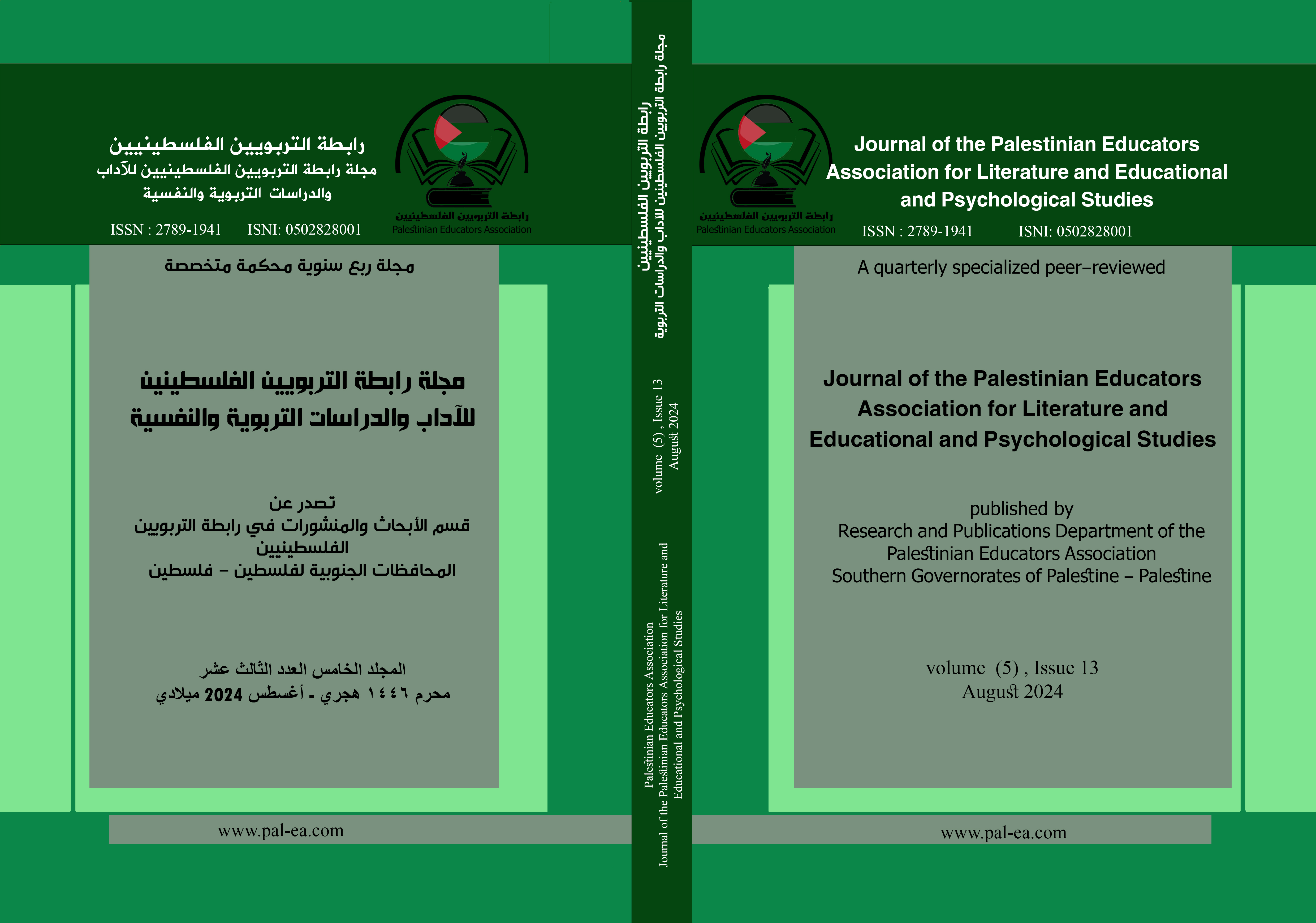The role of improving the physical, psychological and social school environment in stimulating students' motivation towards learning - Boys' School, Kharbatha Al-Misbah Primary School for Boys
Keywords:
School environment, motivation, technology, valuesAbstract
This study aimed to identify the role of improving the school environment, whether physically, psychologically or socially, in enhancing students’ motivation towards the learning process. The researcher studied the case of Kharbatha Al-Misbah Boys School, and took this school as a model for analysis. The study method included data collection and analysis, including reviewing the available literature on the subject, conducting interviews with students, teachers, and school administration, in addition to direct observation of the school environment. The researcher used a sample of students, teachers, and school administration to evaluate the impact of improving the school environment on student motivation. The collected data was analyzed to extract the main conclusions. The results showed that there is a positive impact of improving the physical, psychological and social school environment on students’ motivation towards learning. The study also recommended that schools should give priority to creating a positive environment that nurtures students’ motivation and participation. By implementing strategies that encourage cultural diversity, address stereotype threats, and provide personalized learning experiences through digital technologies, schools can improve student satisfaction, academic outcomes, and overall well-being. Looking to the future, it is essential that educational leaders continue to explore ways to enhance school climate and support students in achieving their full potential.
Downloads
References
References
● [1] Elias Ratinho, Catia Martins. (2023). The role of gamified learning strategies in student's motivation in high school and higher education: A systematic review. https://www.sciencedirect.com/science/article/pii/S2405844023062412
● [2] Charles Gbollie, Harriett Pearl Keamu. (2017). Student Academic Performance: The Role of Motivation, Strategies, and Perceived Factors Hindering Liberian Junior and Senior High School Students Learning. https://onlinelibrary.wiley.com/doi/10.1155/2017/1789084
● [3] School Climate Improvement. (2024). https://safesupportivelearning.ed.gov/school-climate-improvement
● [4] Linda Darling-Hammond, Lisa Flook, Channa Cook-Harvey, Brigid Barron, David Osher. (2019). Implications for educational practice of the science of learning and development. https://www.tandfonline.com/doi/full/10.1080/10888691.2018.1537791
● [5] Weihua Fan, Cathy Williams. (2018). The Mediating Role of Student Motivation in the Linking of Perceived School Climate and Achievement in Reading and Mathematics. https://www.frontiersin.org/articles/10.3389/feduc.2018.00050
● [6] Linda Darling-Hammond and Channa M. Cook-Harvey. (2018). Educating the Whole Child: Improving School Climate to Support Student Success. https://learningpolicyinstitute.org/sites/default/files/product-files/Educating_Whole_Child_REPORT.pdf
● [7] Keyun Zhao, Ning Chen, Guanling Liu, Zhijun Lun, Xinghua Wang. (2023). School climate and left-behind children's achievement motivation: The mediating role of learning adaptability and the moderating role of teacher support. https://www.ncbi.nlm.nih.gov/pmc/articles/PMC9899806/
● [8] Sarah Klevan. (2021). Building a Positive School Climate Through Restorative Practices. https://learningpolicyinstitute.org/product/wce-positive-school-climate-restorative-practices-brief
● [9] Motivation and the Learner Environment. (2024). https://microcredentials.digitalpromise.org/explore/1-motivation-and-the-learner-environment
● [10] Renaissance. (2023). Using qualitative data to improve student outcomes. https://www.renaissance.com/2020/05/18/blog-using-qualitative-data-to-improve-student-outcomes/
● [11] Peter Barrett, Alberto Treves, Tigran Shmis, Diego Ambasz, Maria Ustinova. (2018). The Impact of School Infrastructure on Learning. https://files.eric.ed.gov/fulltext/ED604388.pdf
● [12] Beatriz Pont, Deborah Nusche, Hunter Moorman. (2008). Improving School Leadership. https://www.oecd.org/education/school/Improving-school-leadership.pdf
● [13] American School Counselor Association. (2021). ASCA Student Standards: Mindsets & Behaviors for Student Success. https://www.schoolcounselor.org/getmedia/7428a787-a452-4abb-afec-d78ec77870cd/Mindsets-Behaviors.pdf
● [14] Aslihan Hafzoglu, Sundus Yerdelen. (2019). The Role of Students' Motivation in the Relationship between Perceived Learning Environment and Achievement in Science: A Mediation Analysis. https://files.eric.ed.gov/fulltext/EJ1236386.pdf
● [15] Youling Li, Di Chen, Xinxia Deng. (2024). The impact of digital educational games on student's motivation for learning: The mediating effect of learning engagement and the moderating effect of the digital environment. https://www.ncbi.nlm.nih.gov/pmc/articles/PMC10783726/
● [16] Haleh Yazdi. (2016). How Educators Can Foster Student Motivation. https://digitalpromise.org/2016/08/18/how-educators-can-foster-student-motivation/
● [17] Stella Timotheou, Ourania Miliou, Yiannis Dimitriadis, Sara Villagra Sobrino, Nikoleta Giannoutsou, Romina Cachia, Alejandra Martinez Mones, Andri Ioannou. (2022). Impacts of digital technologies on education and factors influencing schools' digital capacity and transformation: A literature review. https://www.ncbi.nlm.nih.gov/pmc/articles/PMC9684747/
● [18] Atikah Shemshack, Jonathan Michael Spector. (2020). A systematic literature review of personalized learning terms. https://slejournal.springeropen.com/articles/10.1186/s40561-020-00140-9
● [19] Sofia Simoes, Tiago Oliveira, Catarina Nunes. (2022). Influence of computers in students' academic achievement. https://www.ncbi.nlm.nih.gov/pmc/articles/PMC8920860/
Published
Issue
Section
License
Copyright (c) 2024 نور أنيس كرزون (مؤلف)

This work is licensed under a Creative Commons Attribution-NonCommercial-ShareAlike 4.0 International License.
The Journal of the Palestinian Educators Association for Literature, Educational and Psychological Studies
E-issn: 2789-1941
Authors retain Copyright
The Journal of the Palestinian Educators Association for Literature, Educational and Psychological Studies allows Authors retain Copyright and grant the journal right of first publication with the work simultaneously licensed under a Creative Commons Attribution (CC-BY) 4.0 License that allows others to share the work with an acknowledgment of the work’s authorship and initial publication in this journal.
Provided they are the owners of the Copyright to their work, authors are able to enter into separate, additional contractual arrangements for the non-exclusive distribution of the journal’s published version of the work (e.g., post it to an institutional repository, in a journal or publish it in a book), with an acknowledgment of its initial publication in this journal.
Authors are permitted and encouraged to post their work online (e.g., in institutional repositories, disciplinary repositories, or on their website) prior to
and during the submission process.










